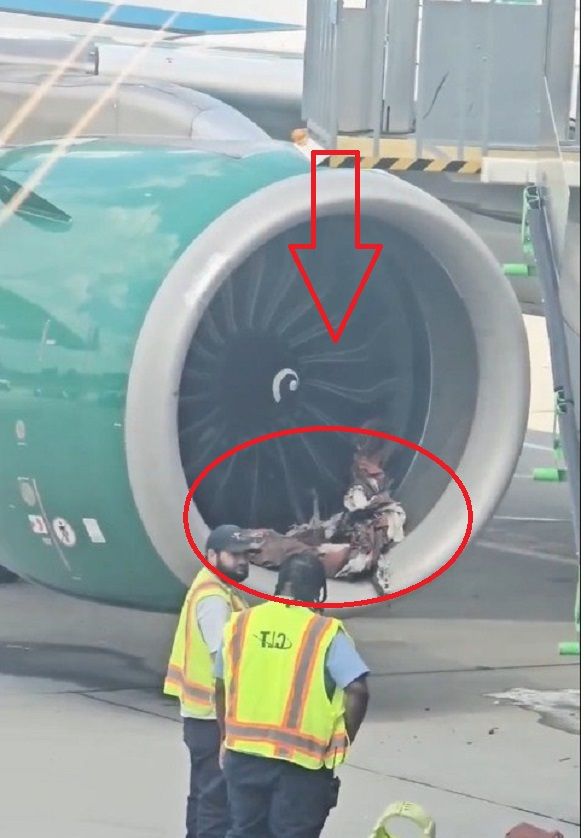On August 16, 2025, what should have been a routine departure from Charlotte Douglas International Airport turned into a tense situation that disrupted travel plans for dozens of passengers and raised concerns in the aviation community.

A Frontier Airlines Airbus A320 preparing for flight F93134, bound for New York’s LaGuardia Airport, suffered unexpected engine damage on the tarmac after a piece of ground support equipment was pulled into one of its engines. While no one was injured, the incident caused nearly nine hours of delays and served as a stark reminder of the risks involved in ramp operations at busy airports. The aircraft at the center of the incident was an Airbus A320-251N, registered as N365FR, which had flown into Charlotte earlier that day from Philadelphia. As part of the standard turnaround process, crews connected an external air-conditioning hose to the aircraft to regulate cabin temperature while it was parked. These hoses are routine equipment used to keep passengers comfortable during boarding.
However, during preparations, the suction force of the CFMI LEAP-1A26 engine drew the hose into its intake. Within seconds, the hose was shredded, creating debris and potential internal engine damage. Ground crews responded swiftly, stopping all operations around the plane and preventing further risk, but the damage meant the aircraft was deemed unfit to fly until a full inspection could be carried out. Passengers who had expected a routine flight to New York suddenly found themselves stranded in Charlotte. Frontier Airlines staff scrambled to secure a replacement aircraft, a process that required coordinating crew schedules, moving another plane into service, and ensuring it was properly prepared for boarding.
The disruption stretched into an almost nine-hour delay, leaving travelers frustrated but ultimately safe. For Frontier, the priority was clear: safety over punctuality. Operating an aircraft with suspected engine damage was never an option, regardless of the inconvenience. The Airbus A320neo family, including the aircraft involved, is well-regarded for efficiency and environmental benefits thanks to its new-generation engines.
However, these powerful engines also generate immense suction forces, particularly during ground operations at low power settings. Even lightweight equipment like a flexible air-conditioning hose can be hazardous if it strays too close. This is why airlines enforce strict safety protocols for ground support operations.
@trendy_viewz Frontier Airlines Airbus A320-251N aircraft (N365FR) left engine ingested a ground air-conditioning hose at Charlotte Douglas International Airport #aircraft #FrontierAirlines #Airbus #planedisaster ♬ original sound – Trendy_viewz
In the confusion following the incident, some reports mistakenly identified the aircraft as an A321, but clarifications later confirmed it was indeed an A320. Such details matter greatly in aviation, where accurate reporting is vital for maintenance, safety investigations, and compliance with Federal Aviation Administration (FAA) standards.
For passengers, the lengthy wait was exhausting. Airport delays often mean missed connections, disrupted schedules, and added stress. Frontier staff provided updates throughout the day, assuring travelers that the airline was working on a solution. While some voiced frustration, most recognized that the alternative—taking off in a plane with potentially compromised engines—was far more dangerous. Aircraft engines are delicate and expensive machines, and even small amounts of foreign object damage can lead to costly repairs and long downtimes.
A shredded hose may not be as catastrophic as metallic debris, but it can still cause serious blockages or wear inside the engine. This is why Frontier’s decision to ground the plane immediately was the only responsible course of action. The delay didn’t just affect the passengers of flight F93134; had the airline not secured a replacement aircraft, the disruption could have cascaded across multiple flights in their network. Frontier’s quick coordination limited the wider impact, though the affected passengers still endured a long day at Charlotte. The incident underscores the importance of ground safety and vigilance in ramp operations. Airport ramps are busy environments, where fueling, baggage loading, catering, and maintenance all happen within a short window.
Each task must be carefully coordinated to prevent conflicts and hazards. The ingestion of an air-conditioning hose highlights how even everyday equipment can create danger when procedures aren’t followed precisely. Frontier Airlines responded by immediately removing the aircraft from service and ensuring FAA inspection protocols would be followed. This action reflected not just regulatory compliance but also the company’s commitment to passenger safety.
The aircraft will remain under review until cleared for future flights. While the event inconvenienced passengers, it also reinforced aviation’s core principle: safety always comes first. Every incident, even those without injury, offers lessons for the industry. In this case, the reminder was clear—foreign object damage prevention is a critical priority, and both technology and human vigilance are essential to keeping air travel safe. For the passengers delayed that day, the experience was inconvenient but ultimately a story of how aviation’s strict safety systems prevented a potential disaster. In the end, travelers reached New York safely, Frontier maintained its safety-first reputation, and the industry gained another case study in why every detail on the tarmac matters.





